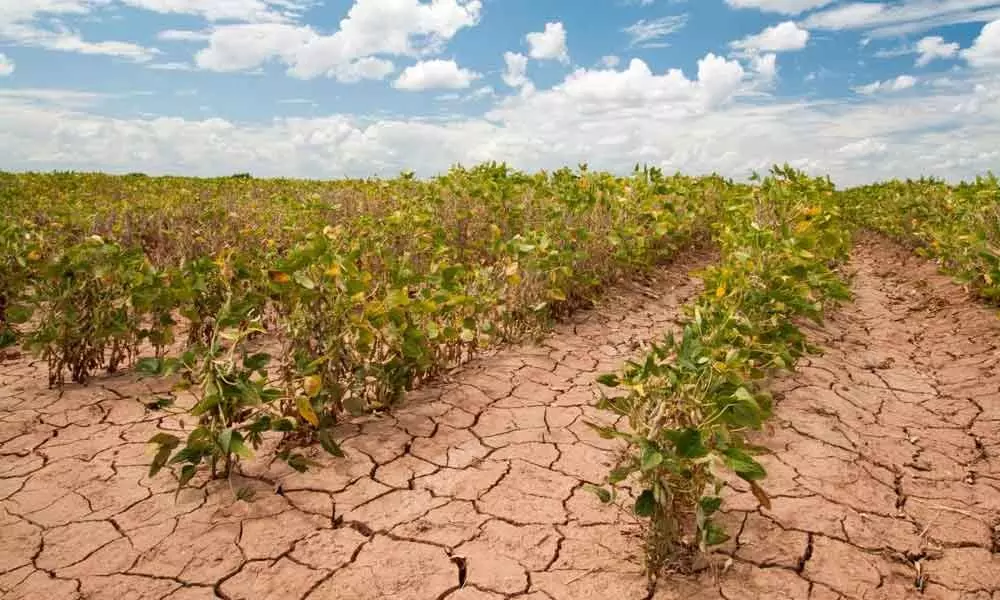Live
- They always want me to win, and now I feel lucky to have been offered a story like ‘Zebra’: Satyadev Kancharana
- ‘Democracy first, humanity first’: PM Modi in Guyana's parliament on two countries' similarities
- PKL Season 11: Telugu Titans register third straight win to top standings
- Is Pollution Contributing to Your COPD?
- NASA Unveils Underwater Robots for Exploring Jupiter's Moons
- Additional Central forces arrive in violence-hit Manipur
- AR Rahman and Saira Banu’s Divorce: Legal Insights into Common Issues in Bollywood Marriages
- 82.7 pc work completed in HPCL Rajasthan Refinery area: official
- Curfew relaxation extended in 5 Manipur districts on Friday
- Tab scam prompts Bengal govt to adopt caution over fund disbursement
Just In
Farming impacted by climate change: The way ahead


Farming impacted by climate change
Researchers led by Princeton University investigated how different climate scenarios and policy interventions could impact smallholder farmers, or those who maintain less than five acres of land using Nepal as a case study.
New Delhi: Researchers led by Princeton University investigated how different climate scenarios and policy interventions could impact smallholder farmers, or those who maintain less than five acres of land using Nepal as a case study. The research team chose South Asia because it is particularly threatened by climate change, meaning that farmers and policymakers will need to make challenging decisions in the coming decades.
They found that by 2050, crop yields will suffer, and their incomes will be slashed by a quarter in the Himalayan nation Nepal. This is likely to prevent some farming households from being able to engage in labour migration, which is a crucial economic tool for many households in the region. Ultimately, these impacts will cause more households to fall into poverty and increase economic inequality.
In the grasslands of Nepal's Chitwan Valley, local farmers rely on the production of rice and other grains to generate household income. But their livelihoods are under threat, as Nepal is experiencing the effects of climate change at a much faster rate than the global average. As these effects worsen, it's unclear what smallholder farmers in Nepal and other South Asian countries will do. They may choose to migrate or, due to a lack of resources, may be forced to live in seemingly inhospitable regions.
A project led by Princeton University researchers investigated how different climate scenarios and policy interventions could impact these smallholder farmers. Today, over 500 million households fall into this category. They found that without any policy interventions, crop yields will suffer, and farmers will lose about a quarter of their incomes on average by 2050 due to the effects of climate change.
Policy interventions can help, though, say researchers. Providing farmers with financial tools like cash transfers and access to insurance would help them withstand the effects of climate change, giving them the ability to migrate or produce more cash crops. In turn, this could improve community income and reduce inequality, the researchers argue in the latest issue of Nature Climate Change.
"People often talk about migration like it's a bad thing, but it actually depends on what kind of migration you're talking about," said lead author Nicolas Choquette-Levy, a graduate student in the Princeton School of Public and International Affairs. In fact, over a quarter of the entire country's GDP comes from migration remittances, or money that is sent back to the country from Nepalis who have migrated abroad. Many studies examine the interplay between climate change and migration, though the novelty with this study is in the approach, Choquette-Levy said.
He and his co-authors employed what researchers call an "agent-based model" that can simulate how individual decision-making and interactions among households, such as sharing information on economic opportunities, would be affected by different policies and environmental conditions.
The model allowed the researchers to look at multiple livelihood outcomes, policy approaches, and climatic effects relevant to smallholder farms in South Asia. "The goal was to assess the gaps in previous methodology by answering three questions: How will climate change impact smallholder farmers? What decisions will they make because of this? And how might policy interventions change this?" Choquette-Levy said. Choquette-Levy conducted the study with Matthias Wildemeersch of the International Institute for Applied Systems Analysis, as well as Princeton co-authors Michael Oppenheimer, the Albert G. Milbank Professor of Geosciences and International Affairs and the High Meadows Environmental Institute, and Simon Levin, the James S. McDonnell Distinguished University Professor in Ecology and Evolutionary Biology.

© 2024 Hyderabad Media House Limited/The Hans India. All rights reserved. Powered by hocalwire.com






